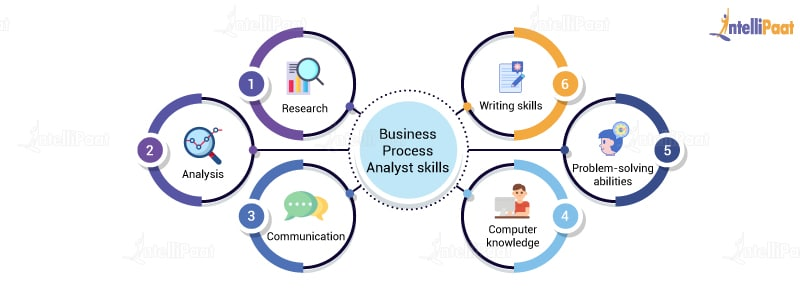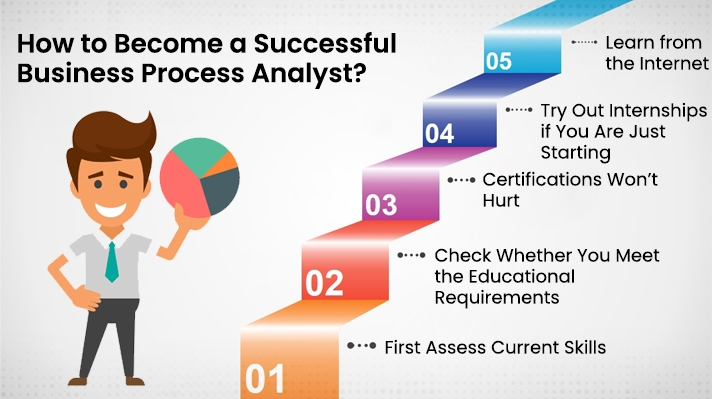Key Skills for Business Process Analyst
February 4, 2024 in Business Architecture, Business Process Modeling, Business Process Analyst3 minutes
Learn the essential skills that every business process analyst needs to optimize organizational workflows, from strong analytical abilities and problem-solving to communication and change management. Discover how these professionals use their diverse skillset to drive improvements, enhance productivity, and ensure compliance in the digital workplace.
Key skills for business process analyst

Business process analysts play a pivotal role in helping organizations function efficiently by examining workflows, identifying areas for improvement, and designing enhanced processes. As the liaison between operational teams and executives, process analysts require a diverse skillset to understand business needs and effectively implement solutions.

Strong analytical abilities
Strong analytical abilities are at the core of any process analyst’s responsibilities. They must be able to carefully observe existing procedures, extract relevant data through interviews and documentation review, and then analyze this information objectively to pinpoint inefficiencies or compliance issues. Process analysts use analytical skills to quantify metrics like turnaround times, throughput, costs per transaction, and error rates to benchmark performance.
Advanced problem-solving capabilities
Advanced problem-solving capabilities allow process analysts to think creatively about new approaches once areas for enhancement are recognized. They work with stakeholders to brainstorm, prototype, and test alternative methods. Process analysts must consider technical feasibility, resource limitations, regulatory requirements, and user adoption challenges when developing proposed process changes. Strong troubleshooting skills are also vital, as analysts often encounter obstacles or need to refine initial solutions.
Outstanding communication and interpersonal skills
As the primary liaison facilitating process improvement projects, outstanding communication and interpersonal skills are a must-have for any process analyst. They interact regularly with team members across all departments and levels of an organization. In addition to active listening and questioning techniques to gather insights, analysts need to clearly convey complex analyses, rationales for changes, and training requirements to diverse audiences. Persuasive presentation abilities help gain support for recommendations.
Technical process analysis
While business acumen is important for process analysts to understand how workflows tie into strategic objectives, technical process analysis skills are also valuable. Familiarity with process modeling software, mapping tools, and documentation standards enables analysts to effectively capture details and socialize documentation. Coding literacy can aid in process automation efforts as well. Analysts may also employ statistical software to analyze metrics and validate performance enhancements.
Project management
Project management expertise is beneficial as process improvement initiatives usually entail multiple moving parts and tight timelines. Analysts often coordinate research, change implementation plans, budget tracking, and stakeholder communications independently or by delegating tasks. Strong organizational abilities help analysts to keep projects on schedule amid daily operational demands on their teams. The role also requires flexibility to adapt to shifting priorities or scope expansions.
Change management
As process experts, analysts act as change agents driving adoption of new procedures. Diplomacy, coaching, and training development and delivery are important skills to support successful change management. Analysts help organizational members understand why changes are needed and provide resources to facilitate smooth transitions. Change management capabilities are crucial considering people often resist alterations to familiar routines.
Most important: Lifelong learning mindsets
Lifelong learning mindsets also serve analysts well as workflows evolve rapidly in response to market changes and emerging technologies. Analysts expand their knowledge of best practices, tools, methodologies, and regulations through continued education. Professional certifications in areas like Lean Six Sigma or business process modeling validate analysts’ process improvement expertise for career advancement as well.
Conclusion
In today’s digital workplace, business acumen, technical skills, communication talents, and ability to manage change are key assets for any process analyst striving to deliver maximum value through operational enhancements. Their efforts directly impact productivity, compliance and customer experience.